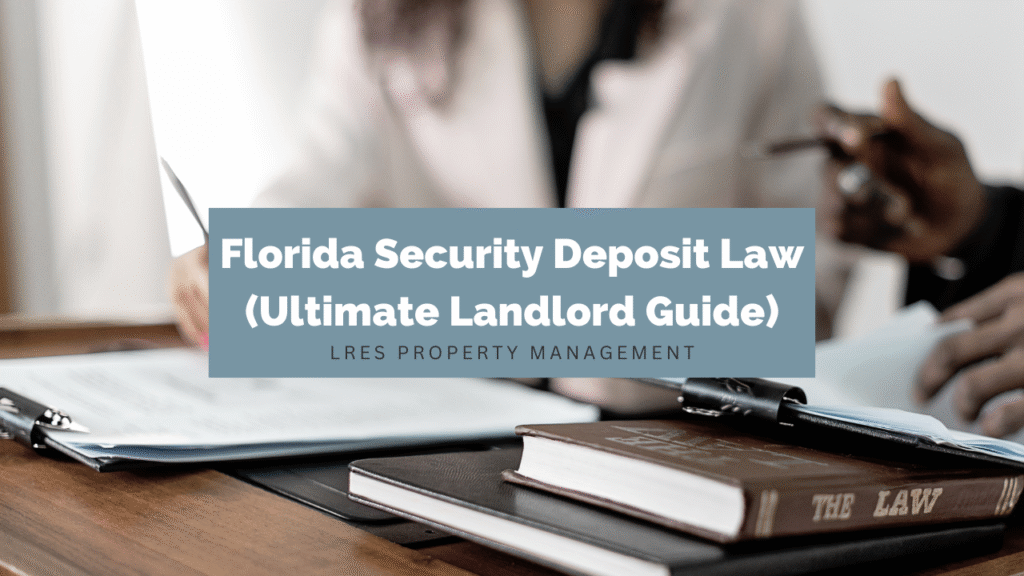Key Takeaways
- No statewide cap – Florida law doesn’t limit how much landlords can charge for a security deposit, though most stick to one to two months’ rent.
- Strict rules for storage & notice – Deposits must be kept in specific accounts or secured with a bond, and landlords must give tenants written notice within 30 days of receipt.
- Clear refund timeline – Landlords have 15 days to return deposits in full, or 30 days to send an itemized notice of deductions via certified mail.
A security deposit isn’t just a box to check—it’s a landlord’s safety net and includes numerous benefits. They include:
- Helping cover unpaid utilities upon move-out. During the lease period, most – if not all – utilities will be in the tenant’s name. If the tenant fails to pay them, Florida’s security deposit law allows the landlord to use the deposit to cover those expenses.
- Repairing or covering excess cleaning to public or private properties. Most leases demand that the tenant return the unit in its same condition (except for normal wear and tear). If a tenant leaves the unit dirty, landlords can take cleaning charges from the deposit.
- Recovering unpaid rent. Nonpayment of rent is a violation of the rental agreement. Landlords in Florida are allowed to use the deposit to cover some or all of this lost income.
- Covering lost rent from early lease breaks. If a tenant abandons the property or ends the lease early, the landlord may deduct associated losses from the deposit.
- Repairing property damage. This includes things like broken appliances, holes in walls, or other damage beyond regular use.
For today’s article, the experts at LRES Property Management put together a guide for landlords on Florida’s security deposit laws, so you can stay informed and compliant with Florida law.
GET A FREE RENTAL ANALYSIS
Here’s a Guide to Florida’s Security Deposit Law
Florida Security Deposit Limit
Unlike a number of states, Florida does not establish a maximum amount that a landlord may charge for a security deposit.

This means landlords can determine the amount based on the rental market, the tenant’s background, or the property type.
However, most landlords charge the equivalent of one to two months’ rent to stay competitive and fair.
Nonrefundable Fees
Are nonrefundable fees allowed in Florida?
Yes, but they must be clearly spelt out in the lease agreement. For example, a landlord could charge a nonrefundable pet fee in addition to the refundable security deposit.
If the lease does not state that a fee is nonrefundable, Florida law requires that it be treated as part of the refundable deposit.
Storing a Tenant’s Deposit in Florida
Florida law is strict about how deposits must be stored. Landlords have three options:
- Hold the money in a separate, non-interest-bearing account.
- Place it in an interest-bearing account in a Florida bank and pay tenants annual interest.
- Post a surety bond with the clerk of the court in the county where the rental property is located.
Landlords must choose one of these methods and cannot mix deposits with personal funds.
LEARN ABOUT OUR PROPERTY MANAGEMENT SERVICES
Written Notice after Security Deposit Receipt
Landlords in Florida must provide tenants with written notice within 30 days of receiving the deposit.

This written notice must explain where and how the money is being held, whether it is in an interest-bearing account, and the rate of interest, if applicable.
Failure to provide this notice may limit a landlord’s ability to make deductions later.
Reasons to Withhold a Tenant’s Security Deposit in Florida
Under Florida law, landlords can withhold all or part of the deposit for the following reasons:
- To fix a repair that was not caused by normal wear and tear.
- To cover unpaid rent.
- To pay for excessive cleaning if the unit is left in poor condition.
- To cover unpaid utility bills tied to the property.
Landlords may not deduct for ordinary wear, like faded paint or worn carpet.
A Walk-Through Inspection
Florida law does not require landlords to perform a walk-through inspection with tenants before move-out.

However, many property owners choose to do so voluntarily.
A walk-through helps document the property’s condition and can prevent disputes later. It also gives tenants a fair chance to address issues before deductions are made.
Security Deposit Refund in Florida
The timeline for returning deposits in Florida is clear:
- Without the deductions, landlords have to give the full deposit money 15 days following the day the tenant vacates the rental property.
- If deductions are planned, landlords must provide written notice within 30 days. This notice must include an itemized list of deductions and be sent via certified mail. The tenant has 15 days to object to the deductions. If they do not respond, you must deduct and return the remaining balance within 30 days.
If a landlord fails to meet these deadlines, they may lose the right to withhold any portion of the deposit.
Change in Property Ownership
When a property changes ownership, the landlord has two options:
- Return the deposit (plus interest, if any) directly to the tenant.
- Transfer the deposit to the new owner, along with a written notice to the tenant that includes the new owner’s name and contact information.
This ensures the tenant’s funds remain protected, even when management changes hands.
Conclusion
Security deposits can be a tricky area for both landlords and tenants. Florida law lays out clear requirements for handling, storing, and returning deposits, but mistakes can still happen.
To keep informed and stay legally compliant, read our blog post on Florida’s landlord-tenant laws. For true peace of mind and a stress-free rental experience, working with a trusted property management company is your best option.
At LRES Property Management, we help property owners stay compliant with Florida law while protecting their investment and maximizing their ROI.
Reach out to us today to get started!
LEARN MORE ABOUT OUR TRUSTED TEAM
Disclaimer: This blog should not be used as a substitute for legal advice from a licensed attorney in your state. Laws frequently change, and this post might not be updated at the time of your reading. Please contact us for any questions you have regarding this content or any other aspect of your property management needs.

